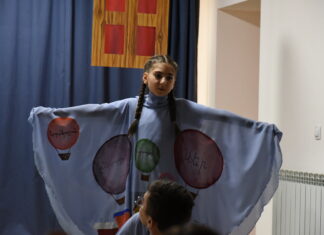Artsvi Bakhchinyan
Special to the Mirror-Spectator
YEREVAN/LONDON — Vaughan (Vahan) Pilikian was born in London to an American mother and Armenian father. After studies in classical languages, fine art and filmmaking at the universities of Oxford, Cambridge and Harvard, he has produced work in several different fields. His career to date has seen him chasing burning barrels in a village in Devon, filming the lives of shipbreakers in northern India, translating the Sanskrit epic the Mahabharata and broadcasting recordings from ancient Babylon on Resonance FM. In 2012 his play “Leper Colony” ran for three weeks at the Yard Theatre in London to controversy and acclaim. In 2016, he was the first and, it turned out, the last British Council Resident Artist in Transcarpathia, Ukraine, where he made a performance about werewolves. Last year he published his third book of poems and he is presently completing work on a feature film about migrants in peril and adrift in the hinterlands of Europe.
Dear Vaughan, I want to start our conversation remembering your father, Hovhanness Pilikian, who died last December. In 1980s he was quite known in the art circles of Soviet Armenia, particularly due to his extraordinary interpretations of Shakespeare. He was a polymath, and I see that you took after him.
My father was a difficult man, as anyone who spent any time with him will attest. But he was a true individual. Nothing held him back. He was a force of nature, a person in whom the destructive and creative impulses were closely imbricated. I certainly inherited a great number of his interests and passions. One thing he did instill in me is a sense that conventions and boundaries are not really a concern. I don’t have a plan or a career: like him, I have only my obsessions and my interests. These things lead me: I do not decide them. The notion of a polymath only makes sense in a divided and damaged society in which the Geist, to use of necessity a German word for a concept we do not have in English, has become fissured and broken. Surely we must aspire to cut across the domains that are mostly very recent creations. If we cannot aspire to hold different kinds of knowledge and technique simultaneously within ourselves then as a society I feel we are doomed to servitude and ignorance.
You translate ancient Indian poetry from Sanskrit into English. One can think that all Sanskrit literature has been already translated into English. Do you make first-time translations or new translations of works that have been previously done and now are outdated?








